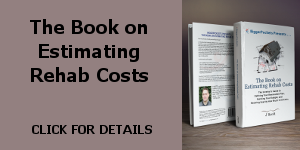Do you make a distinction between being rich and being wealthy? Most people probably don’t, but if you’re going to invest in real estate (or anything for that matter), I think it’s important that you consider the differences and decide which is your goal.
That said, how do I define the difference between being “rich” and being “wealthy”?
Being rich is a function of how much capital (cash) you have. Someone who is rich — in theory — has enough money that he can do whatever he wants to do today. Perhaps he has a job (or a business), but he also has enough money that if he wanted to take some time off (or quit), he has that option. Someone who is rich is can choose to fly to Paris on-a-whim for a weekend getaway, or can buy a new car without thinking twice. The rich guy has the ability to do today what many non-rich people don’t have the option to do, because the non-rich don’t have the money to afford it.
On the other hand, wealth is not just a function of having capital. It is a function of having capital plus having an ongoing income stream to ensure that capital needs are met far into the future. A wealthy person not only can fly to Paris tonight for a weekend getaway, but could stay there for the next 20 years without having to be concerned about running out of money in the meantime. A wealthy person can quit her job this year, and not have to worry about how she’s going to pay for that new car 10 years from now. The wealthy person has the ability to do what many non-wealthy people don’t have the option to do (even what most rich people don’t have the option to do), because the non-wealthy don’t have the income stream to afford it.
While the rich have enough money to do whatever they want today, the wealthy have enough money to do whatever they want forever. And that’s an important distinction. Many non-rich people admire the rich, thinking, “That’s my goal!” What they don’t realize is that the rich are looking at the wealthy thinking, “That’s MY goal!”
So, you’re probably wondering, what does this have to do with real estate?
As I discussed in a previous post, there are many (hundreds!) of different real estate investment paths and investment vehicles. Some will put you on the path to riches. Others will put on you the path to wealth.
For example, a great mortgage broker, a good real estate agent, or a good house flipper (come on, you’ve watched those shows!) can certainly earn enough money to get rich. The best of them can easily earn $1M a year or more. But what happens when they stop working? They stop making that money. And pretty soon, most of them need to stop living the lifestyle that having that money affords them.
But, what about the guy who owns 200 rental units, with each of those units being managed by someone else, and each generating $100 per month. He’s making $20,000/month, and if he stops working tomorrow, he’ll still be making $20,000/month! And next week (next month, next year, ten years from now), he’ll still be making at least $20,000/month. That person is on the path to wealth.
There are many real estate vehicles that will put you on the path to riches. There are many real estate vehicles that will put you on the path to wealth. It’s important to know the difference; it’s also important to know what your goals are…only then can you choose the right vehicles. In real estate, just like any other investing activity, you need to ask yourself, “What is the goal?” And, “Will this investment get me to where I want to be in the long-run?”
For those that want wealth, sometimes it’s necessary to follow the “get rich first, get wealthy second” plan. And sometimes it’s possible to following the “get wealthy first” plan. There’s no right or wrong way to do it (it all depends on your situation and your motivations). The key is to ensure that you know what you want, and create a plan to get there.
By the way, most wealthy people start by getting rich — by selling/flipping houses, having a high-paying professional job (doctor/lawyer), running a business, etc. They make a lot of short-term cash, giving them the option to do whatever they want at that time. But, instead of just spending that cash (with the plan of just going back to work year after year), they instead decide to leverage the capital they have to help them get wealthy. They leverage that money to create investment income streams that will generate more money far into the future, and long after they stop working.
If you’re happy just being rich, that’s great. But, if you want wealth, you need to plan for it. Whether it’s real estate or any other type of investing, you need to ensure you have a plan that fits that goal.




This is a good post, I think a lot of people want to be rich because they want to have cool stuff. I think they’re missing the point.
Just like you, I think of rich as having a lot of stuff. I think of wealthy as having a lot of assets that generate pasive income.
Neither is superior to the other of course. However from what I’ve seen, rich people and wealthy people are definitely different breeds that don’t necessarily understand each other. I’m sympathetic to the “rich” mentality. Those fools just love to work. I mean, they really actually love what they do! Kudos. I’m not like that. I like to build something and then move on to the next. No attachments…that’s wealth. It’s like being a kid and never having to grow up 🙂
Out of curiosity… you identify a path to long term wealth in this post… but then move forward with a strategy of short term profit, why the disconnect? Did your desire to quit your real job and do this full time over ride the logic of a recurring, long term cash flow?
To me, the “perfect” plan is to be able to buy, update, and hold rental properties. Buy it for $50k, put $20k into it upping the value to $100k, refinance at $75k to recover your investment and “pay” yourself $5,000 to live on, and have a rental property for long term wealth. I’m just not sure how feasible that is, sounds great though 🙂
Hey Nathan,
I sent you an email with a more detailed response, but in general, I very much recommend buy and hold for long term wealth accumulation, even if I’m using other — non real estate — avenues…